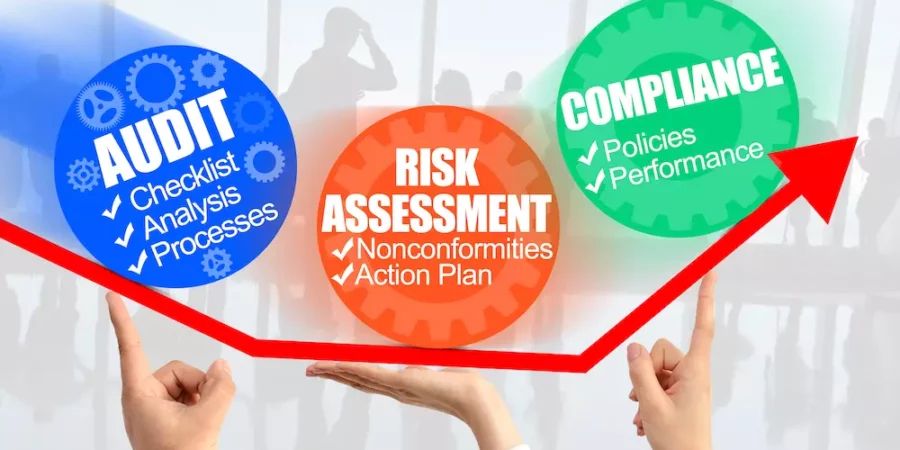Today, choosing a career as an auditor is a smart move. Today there is more focus on compliance, especially in finance and technology.
As an auditor, you play a vital role in ensuring the accuracy and transparency of financial information, which is essential for maintaining the integrity of financial markets and business operations. But there are many different auditing roles today, i.e., not just in finance.
Organizations keen to prevent heft fines and costs for non-compliance are turning to auditors to help them with:
- Regulatory Compliance – adhering to accounting principles and industry regulations, which can prevent fraud and other financial irregularities
- Risk Management – identifying risks and weaknesses in a company’s internal controls and providing recommendations for improvement
- Investor Confidence – provides assurance to investors that a company’s financial statements are accurate and reliable
- Corporate Governance – providing independent oversight and accountability, auditors help ensure that companies operate transparently and responsibly
In this business blog, we look at the various Auditor roles, the key traits of successful auditors, and the pros and cons of such a role.
Pros And Cons Of Being An Auditor
Pros
Job security
Today, there are not many roles that are safe from redundancy. However, auditing is essential for most businesses, and auditors are always in demand. This means auditors’ job security is relatively high, as they are less likely to be laid off or face unemployment.
Furthermore, there are some areas like Cryptocurrency Security Standard (CCSS) auditing that is new and somewhat groundbreaking, so there’s little likelihood an auditor in this field would be out of work for some time.
Professional growth
Auditors can develop and enhance their professional skills through training, continuing education, and diverse work experiences. They can specialize in specific areas such as IT, environmental, or financial auditing, moving from one specialization to another to keep their role challenging.
Career advancement
Experienced auditors can advance to higher positions such as audit manager, senior manager, and partner in accounting firms. There are also opportunities to transition into other roles, such as risk management, internal audit, or financial reporting. Auditors with years of experience often eventually choose to work as freelancers either with an LLC or as sole operators so they can choose their hours, the work they do, and how much it’s worth.
Cons
Long working hours, tight deadlines
Auditors often have to work long hours, especially during peak audit periods, which can be stressful and tiring. When their business or client hasn’t prepared well for compliance, the process to pass takes longer with the need for remediation.
Auditors can be tasked with doing the impossible in the shortest time possible, resulting in working long hours to cut down on the days or weeks it takes for the business to meet the requirements.
Repetitive work
Auditors know the work is repetitive and often tedious, especially when conducting routine audits. This is why moving to different fields of specialization is key to keeping the role interesting.
High levels of responsibility
Auditors carry significant responsibility, as their work can significantly impact the companies they audit. They must be extremely thorough and accurate in their work to correctly identify any issues or risks.
Key Traits of a successful auditor
What soft skills and traits do auditors have to do their job successfully?
Auditing requires technical expertise and also soft skills to effectively perform the job. Some important soft skills and traits that auditors need to have to perform their job successfully include communication, attention to detail, and time management.
Communication skills
Auditors must communicate effectively with clients, team members, and stakeholders at their level and in their language. For example, they must explain complex information clearly and concisely so there is no confusion about what is required to pass the audit.
Analytical skills
Auditors must have strong analytical skills to assess financial information, identify trends and anomalies, and evaluate internal controls.
Attention to detail: Auditors must be meticulous in their work and pay close attention to details to identify errors and discrepancies.
Time management
Auditors often have to work under tight deadlines and therefore must have good time management skills to ensure they can complete their work on time.
Independence and objectivity
Auditors need to maintain high independence and objectivity in their work to ensure that their findings are unbiased and credible.
Adaptability: Auditors must adapt to changing circumstances and be comfortable working in new and unfamiliar environments.
Professionalism
Auditors must maintain high professionalism and ethical behavior in all aspects of their work to maintain trust and credibility with clients and stakeholders.
Teamwork
Auditors often work as part of a team and therefore need to have strong teamwork skills to collaborate effectively with their colleagues and achieve common goals.
Types of Auditors
There are several types of auditor roles in business today, including:
External auditor
An external auditor is an independent auditor not employed by the company being audited. They are typically hired by the company’s board of directors, shareholders, or senior management to provide an unbiased opinion on its financial statements.
However, as any auditor who is independent to the business they are auditing is an external auditor, their discipline may not be in accounting and finance. For example, you would engage an external auditor to assess your compliance with the Cryptocurrency Security Standard (CCSS).
Internal auditor
The primary role of an internal auditor is to provide independent and objective assurance to the organization’s management that its processes and procedures are working effectively and efficiently. This involves reviewing the organization’s operations, assessing its risk management practices, and evaluating its internal controls to ensure they are adequate and effective in mitigating risks.
Internal auditors also help identify areas for improvement and provide recommendations for enhancing the organization’s processes and controls. They may also work with external auditors to ensure that the organization’s financial statements are accurate and comply with accounting standards.
Overall, internal auditors play a critical role in helping organizations achieve their objectives by ensuring that they have effective processes and controls to manage risks and maintain compliance with laws and regulations.
Government auditor
A government auditor is employed by a government agency, such as the Internal Revenue Service (IRS), to audit businesses and individuals for compliance with tax laws and regulations. A government auditor may be an expert in other areas e.g. IT auditing or performance management auditing.
Forensic auditor
A forensic auditor is an auditor who specializes in investigating financial fraud, embezzlement, and other financial crimes. They are also called forensic accountants and often work closely with law enforcement agencies and attorneys.
Information technology (IT) auditor
An IT auditor is an auditor who specializes in assessing and evaluating the effectiveness of a company’s IT systems and controls, including security, data integrity, and privacy. There are different disciplines in technology for auditors, including systems and apps, PCI DSS, client-server, networks, and more.
Environmental auditor
An environmental auditor is an auditor who specializes in evaluating a company’s environmental compliance and sustainability practices.
Social compliance auditor
A social compliance auditor is an auditor who specializes in evaluating a company’s compliance with social responsibility and labor laws and regulations, including human rights and working conditions.





